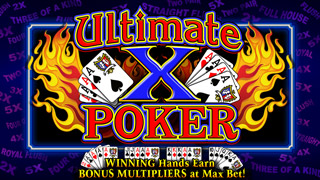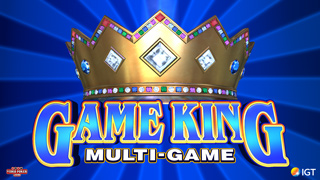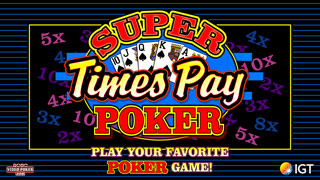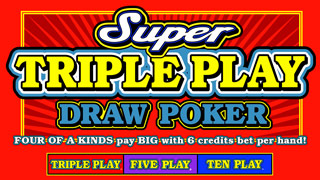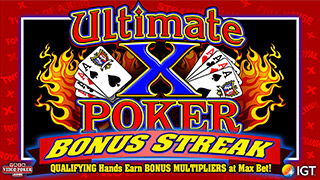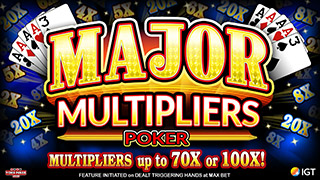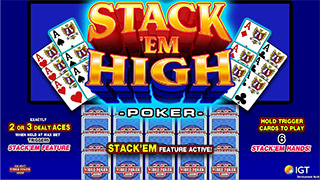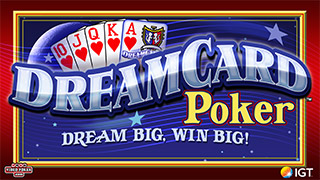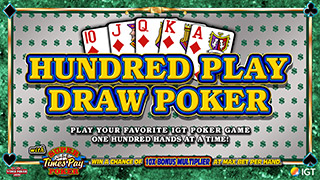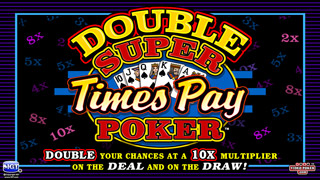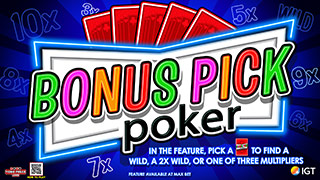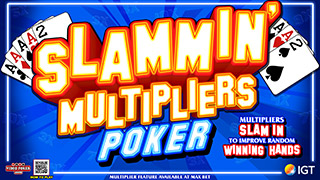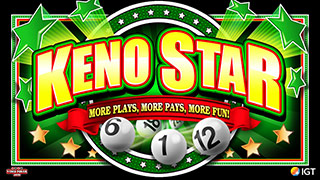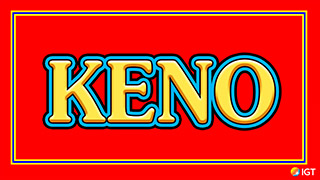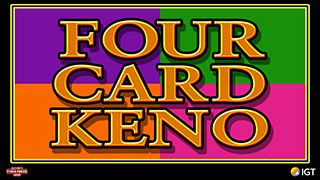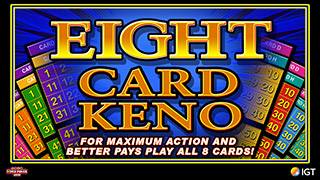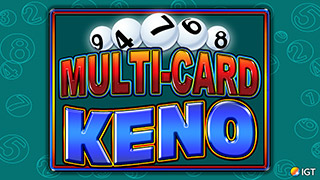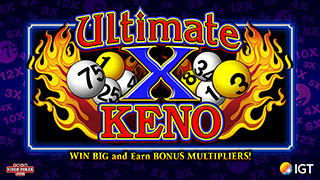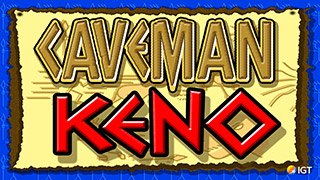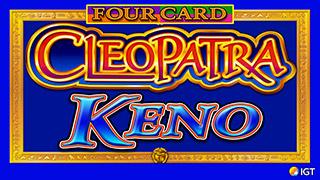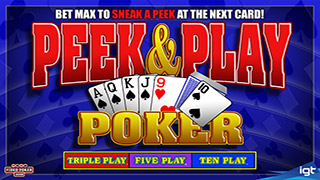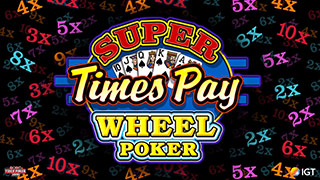Considering a change in strategy
-
Lucky Larry
- Video Poker Master
- Posts: 2693
- Joined: Sat Dec 13, 2008 7:35 pm
Re: Considering a change in strategy
Roveer,
I understand your pain/concerns. Sweet C loves DDB (high volatility with big hits) and prefers to play it versus my desire to play NSUD with low volatility. While I've seen a few STP multiplier hits, the losses were much greater. I will play STP but never with the extra coin multiplier. Why? Because the stats show it probably not worth it especially with the generally low pay tables that exist for STP and Ultimate X. Check out the link to Wizard of Odds info on STP. Especially pay attention to the fact that with the extra coin it increases the DDB volatility by 100% and it is already a highly volatile game. And, the extra coin does not significantly increase the pay returns see the chart.
http://wizardofodds.com/videopoker/tabl ... s-pay.html
I compliment you on your trying to improve your play. I will also tell you that I often feel like you - usually after the fact. Personally, I can barely play single hand VP so here are some tips that I use:
1) Play STP without the extra coin multiplier. Costs less but you get the multi-hand pleasure.
2) Play lower variance/low volatility STP games like JOB/Deuces the majority of the time. Or try a few hands of DDB and if your not hitting switch to low variance games. A royal on JOB/DW pays the same as RF on DDB.
3) I often start with 10 play STP but only play 3 hands and then increase the number of hands or lower the number of hands based on my timing (wins/losses). This allows me the option to play 10 hands when "I'm hot".
4) Consider playing smaller number of coins 10 hands x 1 or 2 coins (especially with low return games) and then build up as your timing (wins). This hurts when you hit a RF (killed me this week the only time I played one coin for about 20 hands of 5 play DDB when I wasn't hitting) but the RF is the only hand where 1 vs 5 really kills you.
The last two trips I've made it a point to leave the machine-go to the room- rest and then try again when I consciously realize I'm not concentrating. I've even considered setting a time limit for play - still working on that one. I don't drink (alcohol) when I'm gambling but then I don't drink... but I've learned to drink bottles of water bottle after bottle. This forces me to literally get up...at least for a few minutes which I try to do when I'm not hitting.
I also like FloridaPhil's idea of pulling winning tickets and putting them back until I'm leaving. That has worked well a few times. Held onto two big tickets for three days at Beau Rivage this weekend so I at least came home with some money.
I hope some of the these thoughts give you ideas to consider. It ultimately comes down to what each of us sets as our limits and those limits vary for each of us.
Good luck.
LL
I understand your pain/concerns. Sweet C loves DDB (high volatility with big hits) and prefers to play it versus my desire to play NSUD with low volatility. While I've seen a few STP multiplier hits, the losses were much greater. I will play STP but never with the extra coin multiplier. Why? Because the stats show it probably not worth it especially with the generally low pay tables that exist for STP and Ultimate X. Check out the link to Wizard of Odds info on STP. Especially pay attention to the fact that with the extra coin it increases the DDB volatility by 100% and it is already a highly volatile game. And, the extra coin does not significantly increase the pay returns see the chart.
http://wizardofodds.com/videopoker/tabl ... s-pay.html
I compliment you on your trying to improve your play. I will also tell you that I often feel like you - usually after the fact. Personally, I can barely play single hand VP so here are some tips that I use:
1) Play STP without the extra coin multiplier. Costs less but you get the multi-hand pleasure.
2) Play lower variance/low volatility STP games like JOB/Deuces the majority of the time. Or try a few hands of DDB and if your not hitting switch to low variance games. A royal on JOB/DW pays the same as RF on DDB.
3) I often start with 10 play STP but only play 3 hands and then increase the number of hands or lower the number of hands based on my timing (wins/losses). This allows me the option to play 10 hands when "I'm hot".
4) Consider playing smaller number of coins 10 hands x 1 or 2 coins (especially with low return games) and then build up as your timing (wins). This hurts when you hit a RF (killed me this week the only time I played one coin for about 20 hands of 5 play DDB when I wasn't hitting) but the RF is the only hand where 1 vs 5 really kills you.
The last two trips I've made it a point to leave the machine-go to the room- rest and then try again when I consciously realize I'm not concentrating. I've even considered setting a time limit for play - still working on that one. I don't drink (alcohol) when I'm gambling but then I don't drink... but I've learned to drink bottles of water bottle after bottle. This forces me to literally get up...at least for a few minutes which I try to do when I'm not hitting.
I also like FloridaPhil's idea of pulling winning tickets and putting them back until I'm leaving. That has worked well a few times. Held onto two big tickets for three days at Beau Rivage this weekend so I at least came home with some money.
I hope some of the these thoughts give you ideas to consider. It ultimately comes down to what each of us sets as our limits and those limits vary for each of us.
Good luck.
LL
-
backsider
- VP Veteran
- Posts: 578
- Joined: Sun May 08, 2011 11:35 pm
I'm not agreeing how managing stopping and then starting up again at a different time is no different than just playing on continuously. I find myself ahead on almost every machine I play, sometime by a little and sometimes by a lot amount. if I had stopped every time I've been ahead 20 bucks in my life I'd be way ahead by now, mostly because I do not use that much of a bankroll. The same goes for my stints at the bj tables. i think casinos are made to make winners keep playing so they can lose it and then lose some more. They've certainly done a number on me that way.
-
New2vp
- Video Poker Master
- Posts: 1881
- Joined: Mon Sep 11, 2006 4:02 am
Haven't gotten any comments about staying away from STP or UX. What's everyone's feelings about that? Afterall I'm paying a vig for those multipliers.I agree with shadowman and Frank, but I thought I would comment on the issue that has not been addressed. In what follows, I am not advocating that it is good to play negative expectation games, but realize that many are willing to pay a reasonable price for fun and entertainment, and that might outweigh expected monetary losses.STP is by far the easier choice of the two to play perfectly, which you stated as one of the goals you enjoy pursuing.The EV on STP is on average more than it is on regular video poker with the same table and requires no strategy changes but has considerably more variance. 14 times out of 15, the game pays out the same 5-coin return as regular video poker and the other 1 time out of 15, when you get a multiplier, it pays out on average 4.05 times the 5 coin return. Of course this costs 6 coins, so the way to find the average return is to start with the regular video poker return for the pay schedule in question and multiply by (14/15 x 1 + 1/15 x 4.05) x 5/6 = 361/360 = 1.002778.This means that the 6th coin is worth 1.016667 times the value of the first 5 coins. [This number is the solution for x in the equation (5+x)/6 = 1.002778.]Of course with the multipliers you will have both bigger losses and bigger wins. But you can play the exact same strategy that you would with regular video poker. If you have the bankroll to weather the extra variability, this may be better if you see the exact pay schedules on the different types of games.Even though the 6-coin wager appears to be a good bet relative to the 5-coin bet, if the machine’s expected return with 5 coins is less than 98.3606557% (the reciprocal of 1.016667), then the 6th coin is adding to your expected loss rather than detracting from it (per hand). On a per 1000 coins basis, the expected loss is lower with 6 coins regardless of the return. However, on a per hour basis, expected loss with 6 coins will be higher unless the machine’s expected return is higher than the threshold mentioned above.Ultimate X requires a different strategy than the base video poker game and I have not seen a lot of evidence on line that many have mastered this. The strategy is different, even with the same pay schedule, whether you are playing single line, 3-play, 5-play, and 10-play. 10-play has over 100 different variations on the same game for computer perfect strategy.I think in general IF you could play perfect strategy, the EV for Ultimate X is generally greater than the base game pay schedule. And for multiline, the multipliers are such that 10x is better than 5x is better than 3x. So, in theory, this could be better than playing the base game. But in practice...another story.It is possible to calculate a non-perfect EV for a single strategy and then make a comparison with the base game but that takes a little bit of know-how and it leaves some valuable percentage points uncollected. It requires further analysis for each schedule to determine if one would be better off with the base game.
-
New2vp
- Video Poker Master
- Posts: 1881
- Joined: Mon Sep 11, 2006 4:02 am
I'm not agreeing how managing stopping and then starting up again at a different time is no different than just playing on continuously. I find myself ahead on almost every machine I play, sometime by a little and sometimes by a lot amount. if I had stopped every time I've been ahead 20 bucks in my life I'd be way ahead by now, mostly because I do not use that much of a bankroll. The same goes for my stints at the bj tables. i think casinos are made to make winners keep playing so they can lose it and then lose some more. They've certainly done a number on me that way.The gist of your post is true when playing negative expectation games. With a little thought, one will see that this is a corollary of what Frank Kneeland is saying: You would lose less if you simply didn't play at all. So, quitting early and playing less will lead to smaller losses...or if you are lucky higher overall gains. But this is not at all dependent on first attaining a particular amount of dollars won.Not playing at all on negative games has a higher EV, since zero is higher than anything negative, but then one loses the utility of fun and entertainment. Of course, if you believe it is good to play a negative expectation game because of the extra fun and entertainment value, the strategy of stopping after a particular win level will deprive you of the extra fun and entertainment...if you value playing the NEXT hour as much as you valued playing the LAST hour.But if your fun quotient is in fact lower for later hours, you would be better simply playing a set number of hours when your fun and entertainment level was high rather than trying to keep track of a particular stopping point.Of course, when playing a positive expectation game (when you add comps and entertainment value to EV), you will always be worse off when quitting after a particular win goal since you are foregoing a positive opportunity in the NEXT hour.
-
backsider
- VP Veteran
- Posts: 578
- Joined: Sun May 08, 2011 11:35 pm
The gist of your post is true when playing negative expectation games. With a little thought, one will see that this is a corollary of what Frank Kneeland is saying: You would lose less if you simply didn't play at all. So, quitting early and playing less will lead to smaller losses...or if you are lucky higher overall gains. But this is not at all dependent on first attaining a particular amount of dollars won.Not playing at all on negative games has a higher EV, since zero is higher than anything negative, but then one loses the utility of fun and entertainment. Of course, if you believe it is good to play a negative expectation game because of the extra fun and entertainment value, the strategy of stopping after a particular win level will deprive you of the extra fun and entertainment...if you value playing the NEXT hour as much as you valued playing the LAST hour.But if your fun quotient is in fact lower for later hours, you would be better simply playing a set number of hours when your fun and entertainment level was high rather than trying to keep track of a particular stopping point.Of course, when playing a positive expectation game (when you add comps and entertainment value to EV), you will always be worse off when quitting after a particular win goal since you are foregoing a positive opportunity in the NEXT hour.
i don't think you understand what most of us play like. I think you mean more credits for the fullhouse and maybe flush in positive expectation games vs fewer in the negative ones. When i roll into town for a few days of fun, vp and bj, the EV of a game just isn't going to mean anything to me. A few credits here and there would never do anything to erase my usual $500 losses or my not-so-often $1000 wins. i hope on the other hand that the better paytables mean something to the people who play all the time, but i'll bet they don't keep any of those extra credits either. They may say they do because they're trying their best to follow how the books and strategy cards are written, but i don't think vp has mercy on anybody anyway. A question about that next hour of what you called "positive opportunity" I don't understand that. if the expectation of a game is figured as how it calculates over a very long period of play, what's in a lone hour?
-
New2vp
- Video Poker Master
- Posts: 1881
- Joined: Mon Sep 11, 2006 4:02 am
i don't think you understand what most of us play like. I think you mean more credits for the fullhouse and maybe flush in positive expectation games vs fewer in the negative ones. When i roll into town for a few days of fun, vp and bj, the EV of a game just isn't going to mean anything to me. A few credits here and there would never do anything to erase my usual $500 losses or my not-so-often $1000 wins.My post was not answering "what most of us play like". It was an answer to what you said in your previous post, "if I had stopped every time I've been
ahead 20 bucks in my life I'd be way ahead by now, mostly because I do
not use that much of a bankroll." if I had stopped every time I've been
ahead 20 bucks in my life I'd be way ahead by now, mostly because I do
not use that much of a bankroll. You likely would NOT be way ahead for multiple reasons. It takes a lot of $20 wins to make up for the few times when you are not up by $20. You didn't say what your stop-loss would be when you would quit in the event that you did not get up by $20, so the analysis of that statement would necessarily be incomplete, but it would take a whole lot of $20 wins over and above your losses to be what most people would consider way ahead. And if you always quit at that point, considering that many of those wins would be measured in mere minutes of play, I'm guessing that the allure of taking a trip to and from casinos for less than 10 minutes of fun and winning $20 would diminish to the point that you would find something else to do that was way more fun.I think I do know why many people play negative expectation games, but I don't pretend to know why each person plays. It is for various reasons. People play negative expectation video poker games for some or all of
the following reasons: because they hope to win money, they hope to be
entertained, they enjoy the challenge of making decisions, or
predicting/hoping what the next deal or draw will bring, passing the
time until another activity starts or while their spouse, partner, or
friend plays a similar or different game...or because they MIGHT win BIG. People play negative expectation games because they don't mind losing a particular amount of money in entertaining themselves, possibly in a similar way to the reason people enter 50/50 drawings, or pay to play golf or have a nice meal without an expectation of winning, or make bets that are not always in their favor. People are willing to pay for lots of products and services. No surprise there. My previous post was not about playing only positive expectation games or as you stated "more credits for the fullhouse and maybe flush". It was about the fallacy of thinking that quitting after a set win amount like $20 is somehow going to be a great strategy that is going to prevent losses and guarantee wins when one does play negative expectation games.A
question about that next hour of what you called "positive
opportunity" I don't understand that. if the expectation of a game is
figured as how it calculates over a very long period of play, what's in a
lone hour?
This is another example of a fallacy that many people make, including many experts when they are imprecise in their language. Your presumption in the question you ask is incorrect. Examine this: "if the expectation of a game is
figured as how it calculates over a very long period of play, what's in a
lone hour?"The expectation is NOT figured "as how it calculates over a very long period of play." On most video poker games that we discuss, the expectation of each hand for that particular game before the Deal button is pushed is identical. It is the sum of the products of the possible amounts won times the probability of each of these possibilities. You don't need to play the game for a long time or even once to figure out its expectation. Granted, lots of people cannot do that, but a whole lot of people can.If the game is a negative game, that expectation is negative on each and every hand. It does not require calculation over a very long period of play. Of course, the actual outcome will be different than the expectation and the actual outcome will be a win on some hands, a push on others, and a loss on still others.It is not impossible to win when playing a negative expectation game. But it is harder to win a large proportion of one's wagers the longer one plays. And what is precise is that the average loss will get closer (in a percentage sense) to the negative expectation over a greater number of plays. You do not need an infinite amount of play to get closer to that negative expectation. But the more anyone plays, the closer the average outcome will be to that negative expectation (or even lower if there are decisions to make holds that are not the best EV play).However, to answer your question, I was talking about making a decision to play the NEXT hour because...Every decision that you make to play is about the NEXT hour or perhaps more precisely the NEXT play. You can't make a decision to change what happened in the past, so you cannot make a choice to "unplay" what you did in the past. If you decide to make another play, it is necessarily in the future and if it is going to be on a negative game that you had already played, you probably had decided that those negative expectations were offset with some positive reasons to play the game.If you decided to play the negative expectation game in the first place, there must have been some offsetting reason to play other than the expectation of winning. Unless those offsetting reasons magically changed when you happened to have a positive outcome on a play or two, they would still exist and offset the expectation of a loss in the NEXT hour as well.Now, if your goal is to tell your spouse or friend (or yourself) that you won on a particular trip regardless of the amount and that is more important to you for some reason than continuing the fun you anticipated in playing the next hour, then by all means quit. Certainly, you can have a higher percentage of winning trips by quitting when ahead by $20. But, just as certainly, that will not ensure a higher percentage of won dollars compared to lifetime dollars wagered...or being way ahead. Based on your writings I don't expect agreement; I'm guessing that you're not expecting agreement from me on your next post. I'm just putting another point of view out there for the few that read these. If everyone had the same viewpoint, even if they were all right, the world would be a duller place. Of course, I think my viewpoint is the correct one...just as I expect you think yours is...unless you're just yanking our chains.Who knows, maybe the truth is somewhere in between...but that's not what I'd bet.
-
backsider
- VP Veteran
- Posts: 578
- Joined: Sun May 08, 2011 11:35 pm
Thank you. My viewpoint isn't anything scientific, just how i see what's going on when i play. I like many have a group of friends who play nothing but those positive progressive deuces wild games at the Palms and have for years. They all say they know the game perfectly and can play it at a very fast and low error rate, but they all say they lose year after year. In fact if it were not for all the nice extras the slot club there hands out they'd be complaining but they aren't. My play is a combo of ddbp, rarely 10/6 because it's not easy to find, and basic strategy bj and i don't count cards. So i play negative expectation games in summary. So are the games i play vs. what my friends play really any different? I understand their expectation is higher but that's a lot different than actual results to me. Your explanation of the hand-by-hand positive expectation on a positive game vs the expectation of that game over the longrun is interesting. So if i'm playing fullpay tdbp with cashback and something else that makes it a positive expectation game, vs a 7/5 bonus poker game with no slot card, i don't see how every tdbp hand played is a better expectation than every comparative bp hands played. Individually I mean. I can almost guarantee that any 10 hands i played on the bp game would, hand-by-hand, beat out the results from any 10 hands i played on tdbp. Not over lots of hands, just 10. Don't ask me how i thought of this example because it just popped into my mind.
-
Frank Kneeland
- VP Veteran
- Posts: 762
- Joined: Wed Feb 02, 2011 6:59 pm
When I left home this morning I said something to the effect of, "If you don't believe me, listen to Shadowman and New2vp." I get home and spend 45 min going through all these posts just to find out everything has been said for me, and I have no contribution to add.Any chance I could get you guys to go along with me on a date and do the Cyrano De Bergerac thing.~FKP.S. Would either of you two brainiacs like to come on my Radio show?
-
New2vp
- Video Poker Master
- Posts: 1881
- Joined: Mon Sep 11, 2006 4:02 am
Your explanation of the hand-by-hand positive expectation on a positive game vs the expectation of that game over the longrun is interesting. So if i'm playing fullpay tdbp with cashback and something else that makes it a positive expectation game, vs a 7/5 bonus poker game with no slot card, i don't see how every tdbp hand played is a better expectation than every comparative bp hands played. Individually I mean. I can almost guarantee that any 10 hands i played on the bp game would, hand-by-hand, beat out the results from any 10 hands i played on tdbp. Not over lots of hands, just 10. Don't ask me how i thought of this example because it just popped into my mind.I have no problem with you preferring to receive a lower expected value when presented with two options. Lots of smarter people than you or I may choose a lower-EV option depending on the selection presented to them.With apologies or credit to Nobel prize winner Maurice Allais (who used this example in a different way) if presented with Example A or Example B below, many people would choose Example A.Example A100% Chance of $1,000,000Example B89% Chance of $1,000,000 1% Chance of $010% Chance of $5,000,000Example B has an EV of $1,390,000 [ (.89 x 1 + .01 x 0 + .10 x 5) x $1,000,000 = $1,390,000 ]while it is easy to see that Example A has an EV of $1,000,000.But you can't blame people if they would like the certain no-risk choice of $1,000,000 even if it has the lower EV. Of course, we haven't addressed what it would cost a person to be allowed this choice, but let's assume that the cost or wager invested for either Example is the same.Now, let's change this up a bit and see what happens if you are able to choose 100 repetitions of Example C vs. Example D.Example C
100% Chance of $10,000
Example D
89% Chance of $10,000
1% Chance of $0
10% Chance of $50,000Of course 100 chances at example C is still $1,000,000 in hand. And some would still choose it. I would classify those people as perhaps one of these three types (1) extremely, perhaps pathologically, risk averse, (2) people who could not visualize what the outcome of 100 repetitions of Example D would be, or (3) people who would not trust that the random number generator (RNG) in Example D was fair.If we could educate people as to the range of outcomes and the chances of each outcome from Example D and assure them that the RNG was indeed fair, that would leave only perhaps the most pessimistic who would choose example C. And the most pessimistic likely would not be open to any gambles on devices like video poker machines.Consider that the odds of earning less than $1,000,000 from Example D are more than 50,000 to 1 against. The odds of earning less than $900,000 are more than 2 trillion to 1, so if everyone in the world were presented this option, it would be a likely outcome that no one would be so unlucky as to leave with less than $900,000. Do you really believe that in a drawing of everyone in a 50,000-seat stadium, you will be the one singled out to earn less than $1,000,000? And even then, you will still almost certainly get $950,000 or more. On the other hand, the bright side has the odds of making at least $1,200,000 when choosing Example D at about 16 to 1, meaning that you would get $1,200,000 (or more) 16 times for every 1 time that you would get less.In choosing between Examples A and B, those who chose Example A could certainly be completely rational and may even be in the majority. As I said, there is no problem there. When choosing between Examples C and D, I'm certain that there will still be those who choose Example C over Example D, but it will be much harder to convince me that they are making an intelligent, informed choice.Of course, the choice that you set up of 99.58% TDB + 1% cashback vs. 98.01% Bonus Poker is not exactly the same as choosing between the Examples that I listed. Certainly if you chose the proceeds from 10 hands of Bonus Poker over the cashback and the gains from 10 hands of TDB, I would find no fault with that.I will leave it to you and others to determine for themselves whether the video poker choice to play one vs. the other (when playing over a multiple-hour session, which may be more in line with people on this forum than playing only 10 hands) is more like the choice of a single outcome (Examples A & B) or is more like the choice of a composite of many outcomes (Examples C & D).
-
shadowman
- Video Poker Master
- Posts: 3587
- Joined: Mon Oct 23, 2006 5:42 pm
P.S. Would either of you two brainiacs like to come on my Radio show?
I suspect my somewhat monotone voice would put your audience to sleep. Besides, Bob and I have never got along all that well.



